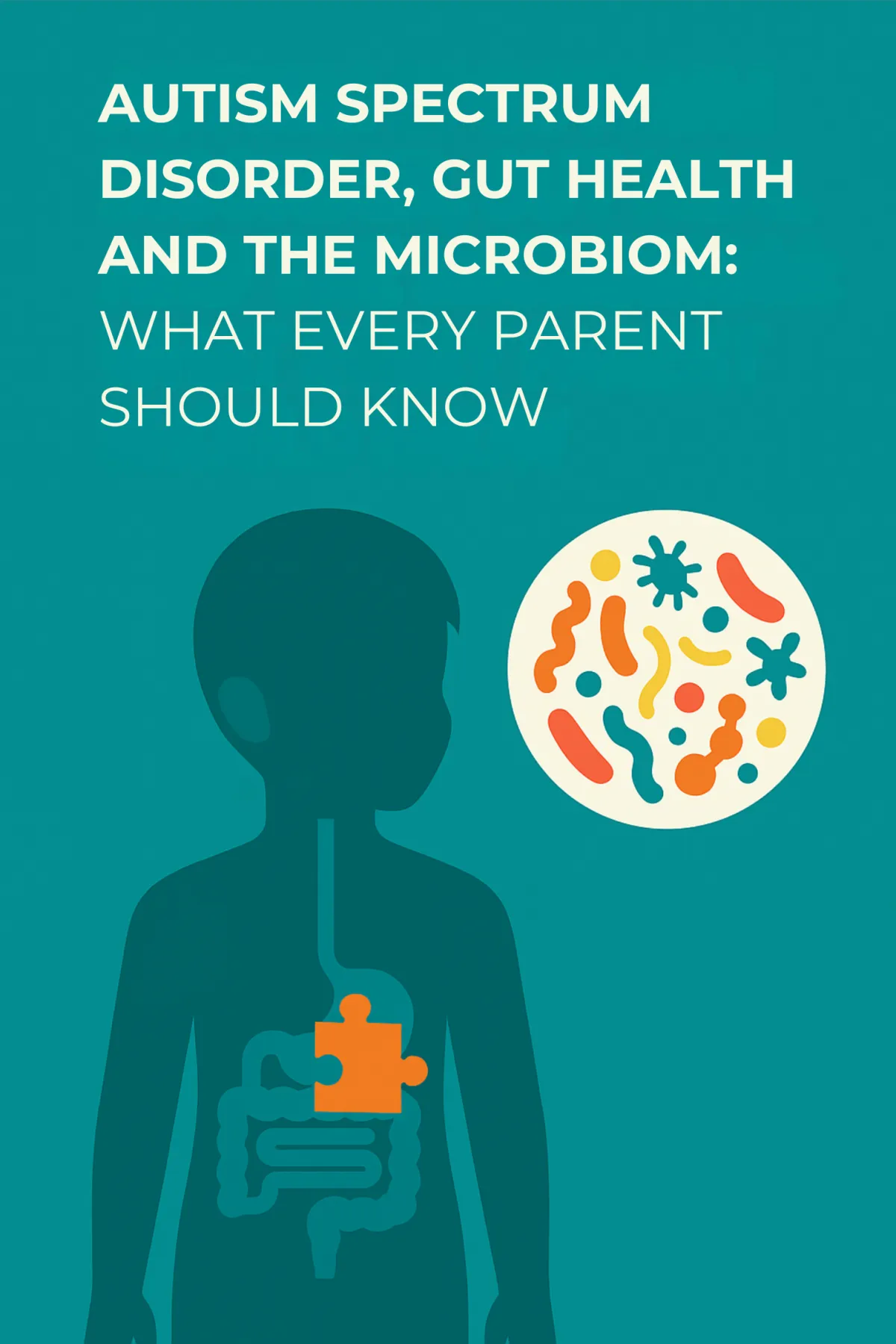
Subscribe to the monthly blog
Join our community and get regular emails on Gut Health, Stress Management, Nutritional Strategies and Health Habits.
Library

Autism Spectrum Disorder, Gut Health, and the Microbiome: What Every Parent Should Know
Autism Spectrum Disorder (ASD) affects approximately 1 in 70 Australians and presents a wide range of challenges related to social communication, sensory sensitivities, repetitive behaviours, and often, digestive issues. While ASD is a neurodevelopmental condition, emerging research continues to highlight the powerful role the gut and microbiome play in brain health and behaviour. For many parents, this offers a new and hopeful perspective: supporting gut health may support overall wellbeing and improve quality of life for children on the spectrum.
The Gut-Brain Connection: Why It Matters in Autism
The gut-brain axis is the bidirectional communication system between the gastrointestinal tract and the central nervous system. It’s regulated by the vagus nerve, immune pathways, and—importantly—the gut microbiota. This communication affects everything from digestion to emotion and cognition.
Research consistently shows that many children with ASD also experience gastrointestinal (GI) problems, such as constipation, diarrhoea, bloating, and abdominal pain. A 2019 meta-analysis published in Autism Research found that children with autism are more than four times as likely to suffer from GI symptoms compared to neurotypical peers. What's more, the severity of GI issues often correlates with increased irritability, anxiety, and social withdrawal.
Microbiome Differences in Children with ASD
Numerous studies have documented distinct differences in the gut microbiota of children with ASD compared to neurotypical children. For example:
Higher levels of potentially harmful bacteria such as Clostridium species
Lower levels of beneficial bacteria like Bifidobacterium and Prevotella
A 2022 study published in Frontiers in Cellular and Developmental Biology revealed that gut microbiota imbalances in ASD are not only common but may also contribute to systemic inflammation, altered neurotransmitter production (such as serotonin and GABA), and impaired gut barrier function—known as "leaky gut."
Promising Treatments: What the Science Says
One of the most discussed interventions in this space is Microbiota Transfer Therapy (MTT), also known as fecal microbiota transplant (FMT). A landmark study led by Arizona State University researchers showed that children with ASD who received MTT experienced up to a 50% reduction in core autism symptoms two years post-treatment, alongside lasting improvements in GI health.
Additionally, a growing number of clinical trials have explored the use of probiotics, prebiotics, and synbiotics:
Probiotics (beneficial live bacteria) like Lactobacillus and Bifidobacterium have shown improvements in GI symptoms and even modest behavioural benefits.
Prebiotics, such as inulin and fructooligosaccharides (FOS), feed beneficial bacteria and help restore microbiome balance.
Synbiotics, a combination of the two, have demonstrated superior benefits for reducing anxiety and improving digestion.
A 2024 randomised controlled trial published in the Journal of Autism and Developmental Disorders found that a 12-week synbiotic intervention led to reduced anxiety and improvements in stool consistency among children with ASD.
Nutrition and the Microbiome: Practical Steps for Parents
Supporting your child’s gut health doesn’t necessarily require advanced therapies. Dietary changes can play a significant role in shaping a healthy microbiome and reducing inflammation:
Increase Fibre Intake: Most beneficial gut bacteria thrive on dietary fibre. Offer a variety of plant-based foods like fruits, vegetables, legumes, and whole grains.
Reduce Ultra-Processed Foods: Packaged snacks high in sugar, additives, and emulsifiers can disrupt the gut lining and alter microbiota diversity.
Include Fermented Foods: Unsweetened yoghurt, kefir, sauerkraut, and kimchi provide live cultures that support microbial diversity.
Avoid Common Triggers: Some children may benefit from reducing gluten, casein (dairy proteins), artificial colours, or preservatives, especially if GI symptoms or behavioural changes are noticed.
Stay Hydrated: Proper hydration supports digestion and bowel regularity.
Supplements That May Help
While food should be the foundation, certain supplements can offer additional support. Always consult a healthcare professional before beginning any supplement routine.
Probiotics: Choose clinically tested strains such as Lactobacillus rhamnosus GG, Bifidobacterium longum, or Saccharomyces boulardii.
Digestive Enzymes: These can help children who struggle with breaking down proteins, fats, or carbohydrates.
Omega-3 Fatty Acids: Found in fish oil, they support brain development and reduce inflammation.
Vitamin D: Often low in children with ASD and critical for immune and brain function.
Magnesium and Zinc: Both play a role in mood regulation and neurological function.
A Note of Caution: Personalisation is Key
It's important to recognise that what works for one child may not work for another. ASD is a spectrum, and so is gut health. Work with practitioners experienced in integrative or functional medicine who understand the interplay between nutrition, microbiota, and neurodevelopment.
Avoid one-size-fits-all approaches, and keep a detailed symptom and food diary to track what helps and what doesn’t. Testing, such as a comprehensive stool analysis, can guide more targeted interventions.
Final Thoughts
There is no cure for autism, but there are ways to support your child’s health, behaviour, and quality of life—and gut health is emerging as a key part of that picture. Nutrition, microbiome support, and thoughtful supplementation can make a significant difference when guided by evidence and individual needs.
As research continues to unfold, one thing is clear: the gut and brain are not separate systems. They are intimately connected. And for many children on the spectrum, healing the gut may offer a gateway to brighter days.

